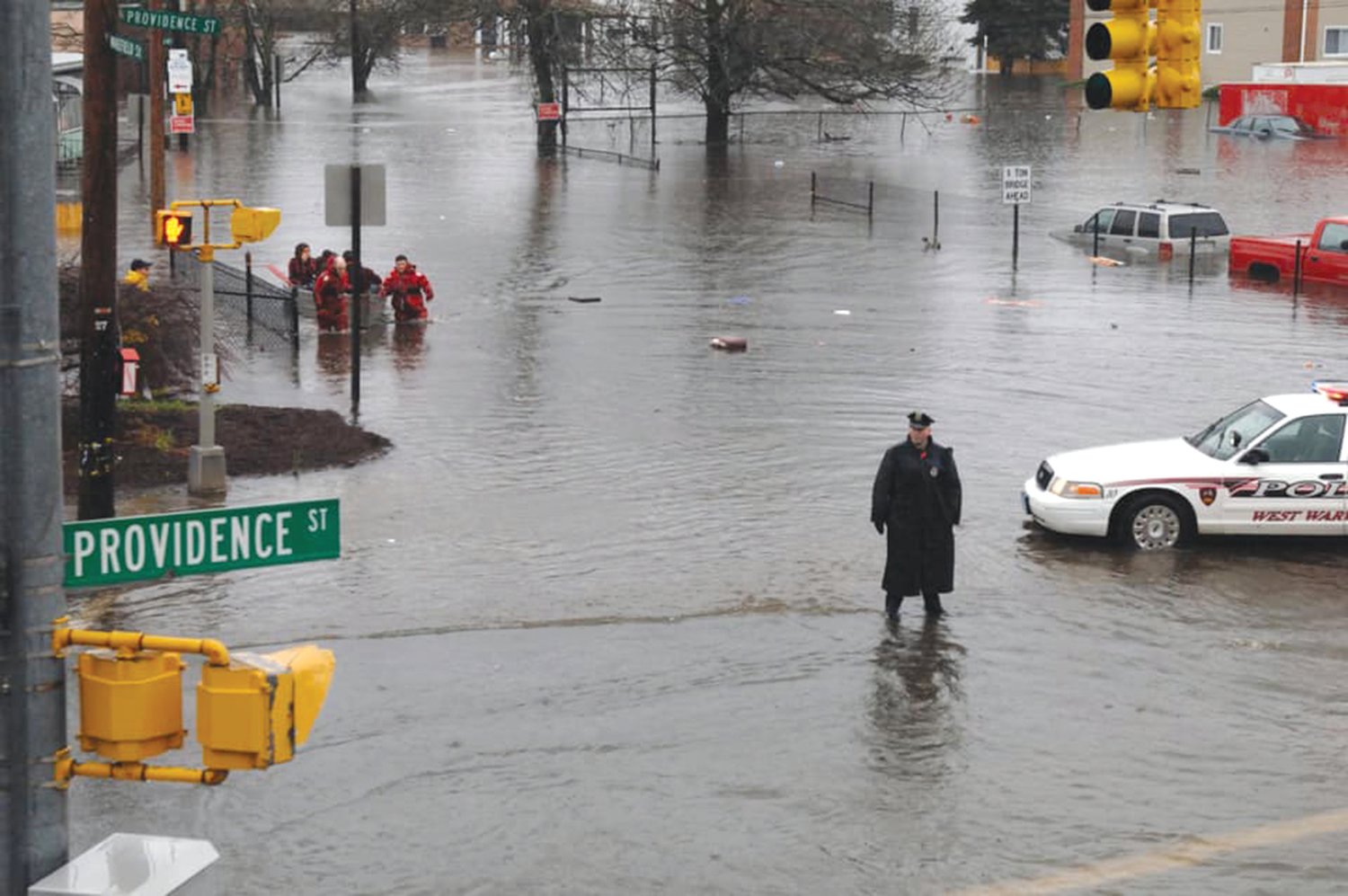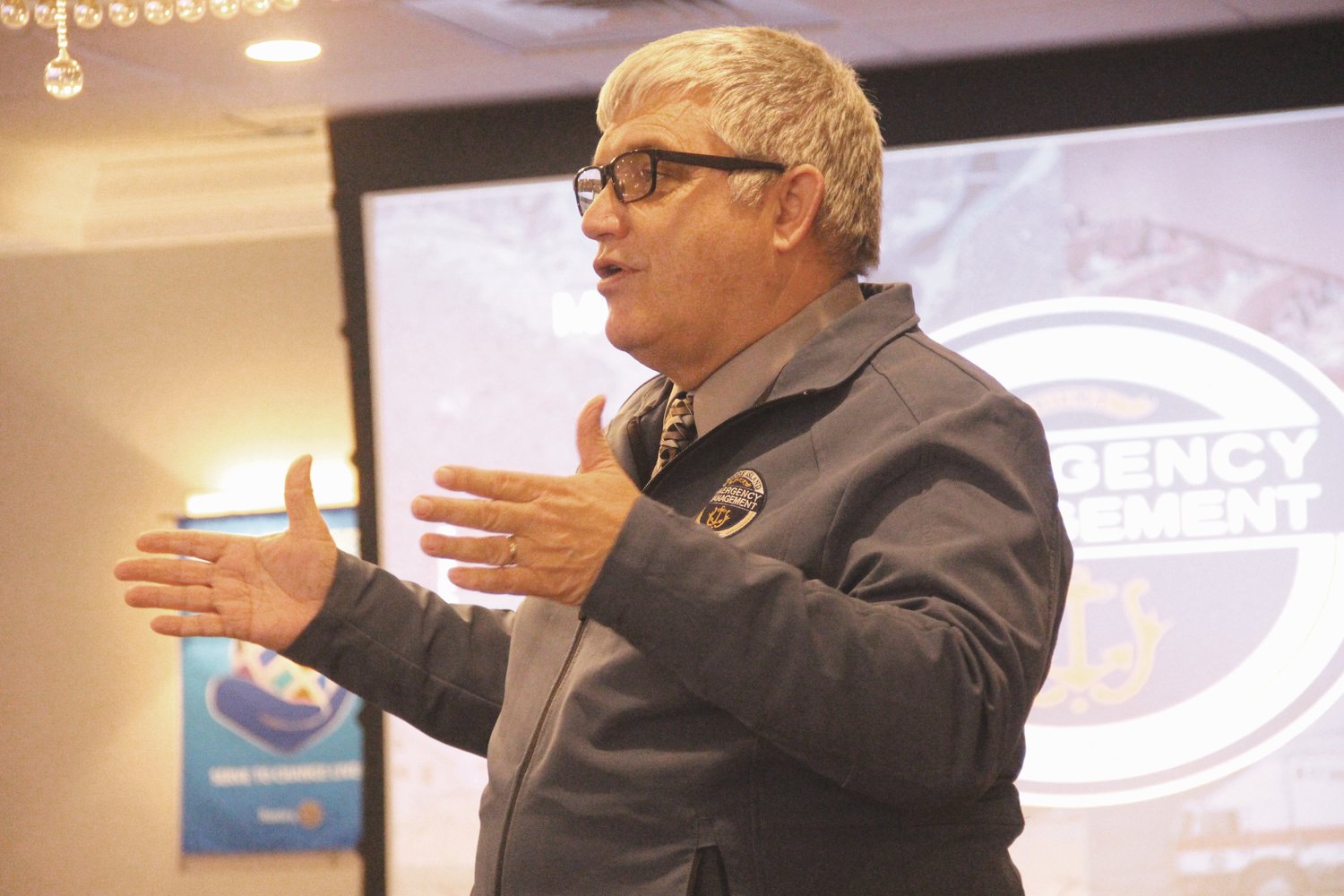RIEMA: Preparing for everybody's worst day.
On the same morning Rhode Island Emergency Management Executive Administrator Tom Guthlein gave a presentation to the Warwick Rotary Club, RIEMA was coordinating the passage of a LPG (liquefied propane gas) tanker up Narragansett Bay to the Port of Providence. Two Coast Guard vessels, one in the bow and another following the stern and a helicopter escorted the tanker.
Guthlein explained that the Coast Guard considers ships carrying LPG as crucial fuel deliveries.
Because the channel is narrow going into Providence a helicopter flies in front of the ship and lets the water assets know if someone is in the channel. The escorts ensure the channel is clear.
“That’s a safety precaution we have,” said Guthlein. He noted that the channel is narrow and it could be problematic if the tanker had to alter course.
Because of the level of coordination needed between the State and Federal Agencies RIEMA’s State Emergency Operation Center in Cranston was staffed that day to make sure everything went smoothly.
Escorting the LPG tanker is just one of the many situations that RIEMA helps with.
While the agency helps in a number of different ways Guthlein said that the public usually associates emergency management with hurricanes, floods, and winter storms. “But we do a lot more than that,” he said Guthlein.
Guthlein said that RIEMA is like FEMA but at the State level.
He said that the motto for the agency is “we’re always planning for everybody’s worst day.”
In order to accomplish that Guthlein said that RIEMA has many different partnerships with the federal government, municipalities and a number of different organizations.
RIEMA also works with Massachusetts and Connecticut. He said RIEMA monitors hundreds of first responders calls daily from both in and out of state.
“We’re always going across each other's state to help each other,” said Guthlein.
One partnership Guthlein pointed to is with the Rhode Island Medical Reserve Corps, 8,000 volunteers that includes doctors, nurses and people without medical training.
“During the pandemic they have been lifesavers,” said Guthlein.
Guthlein said RIEMA is divided into different branches.
One of those is mitigation, which plans for example for situations arising from Climate Change and sea level rise.
Another one of the branches works on recovery.
Guthlein said that they are in recovery right now for the pandemic.
“Everything that we're doing right now seems like a response but it's actually in the recovery phase,” said Guthlein.
One of the ways RIEMA has been helping is through getting more test kits. Guthlein said that they recently put in a request with FEMA to get 1 million tests for the State.
Guthlein said that once the tests come to Rhode Island they will be put in the state warehouse which RIEMA runs.
Guthlein said a 255,000 square feet warehouse houses all of the equipment and supplies used for the pandemic.
“Everything from the alternative hospital site to the bandaids that are needed for the vaccinations,” said Guthlein.
An example of RIEMA assistance was three years ago when Block Island lost its public safety communications. RIEMA was erected two portable communication towers and restored communications for the summer.
In order to fulfill the agency’s motto RIEMA organizes and participates in a number of different trainings to be prepared for a number of different emergency situations.
One of the ways they do so is by creating different scenarios to train for. Guthlein said that in 2019 plans were developed for federal, state and local agencies to cooperatively conduct search and emergency rescue operations on the water, in urban areas and in wilderness areas throughout the state.
Because of the pandemic those plans had to be put on hold.
During an event in October representatives from federal, state and local agencies conducted tabletop exercises at the Radisson Hotel as a prelude to live exercises next spring to troubleshoot and improve upon the plans.
Guthlein said that while the airport does a lot of training for what happens when there is a problem on a runway, he said there is little training for what happens if an aircraft lands in the water.
With the lack of current training for those scenarios Guthlein decided to create a table top plan and training exercise for what would be done if a large passenger plane landed in the bay and what the response would be using the U.S. Coast Guard, State and municipal assets.
When it comes to inclement weather, Guthlein said RIEMA stays in touch with the National Oceanic and Atmospheric Administration and RIEMA has their own seven-day modeling for weather.
He said most storms start on the west coast and come east and the modeling they have is based on that, while the National Weather organization base its modeling on a broader scale.
Within three to four days of a storm arriving, Guthlein said RIEMA is able to begin giving estimates to government officials of when it will arrive and how much snow or other inclement weather is expected to arrive. By doing so they are then able to start making decisions in regards to things like closures.
During hurricane season Guthlein said that RIEMA is in touch with the national Hurricane Center once a week.
Another facet of RIEMA is incident command teams that are deployed to assist municipalities when needed.
Guthlein said that one example of those teams helping was during the 2019 Newport gas outage. For that incident RIEMA sent 8 people from their team while FEMA sent 15 to help the City of Newport.
The almost two dozen employees helped to organize things with City officials and then reported back to RIEMA so they could get them everything they needed. One of the issues was being able to feed 22,000 people quickly with no gas.
“One of the big things with emergency management is thinking outside the box,” said Guthlein.
Inside the Emergency Operation Center was a new employee, Guthlein said, who came up with a suggestion.
“Can we get all the food trucks in the state to go down there and feed people,” Guthlein recalled the employee asking.
The idea was well received by other staff members and RIEMA called the Commerce Department and got in touch with different food trucks. Soon 45 trucks were there and RIEMA paid the food truck owners to feed the residents of Newport.
One of the most iconic things about RIEMA is the Emergency Operation Center.
Guthlein said with representatives from a number of different organizations and agencies inside one room, they are to get a lot of things done during emergencies.
“They can solve problems by talking to each other,” said Guthlein. The command center includes a governor’s cabinet room that is used so officials can follow what’s happening without being a distraction to those on the floor.
The room is referred to as a fish bowl since officials can see what's happening but those in the command center can’t see them.
“They can look and see them but they can’t see the cabinet or governor,” said Guthlein.










